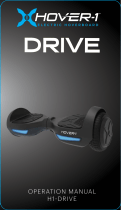
WARNING
If a system error occurs or an improper operation is performed while
riding the hoverboard, the device will alert the user in a variety of ways.
You will notice the running indicator light will turn red and you will hear a
beep sound, alerting you to take precaution and cease operation. The
hoverboard may stop suddenly.
The following are common occurrences that will produce safety alerts.
These notices should not be ignored, and appropriate action should be
taken to correct any improper operation, failure, or errors.
• Unsafe riding surfaces (uneven, too steep, unsafe, etc.)
• Battery voltage is too low.
• The hoverboard is still charging.
• During operation, the platform self initiates to tilt due to excess speed.
• The hoverboard is overheating, or the motor temperature is too high.
• The hoverboard has been rocking back and forth for over 30 seconds.
• If the system enters protection mode, the alarm indicator will light up
and the hoverboard will vibrate. This typically occurs when the battery is
about to run out of power.
• If the platform is tilted forward or backward more than 10 degrees, the
hoverboard will power o and stop suddenly, possibly causing the rider to
lose balance or fall o.
• If any tires are blocked, the hoverboard will stop after 2 seconds.
• When the battery level has depleted below protection mode, the
hoverboard will power o and stop after 15 seconds.
• If a high discharge current is produced during use (such as driving up a
steep slope for a long period of time), the hoverboard will power o and
stop after 15 seconds.
• Ensure that the charging port is clean and dry.
• Make sure that there is no dust, debris, or dirt inside the port.
• Plug the charger into a grounded wall outlet. The charging indicator light
on the charger will be green.
• Connect the charging cable to the power supply (100V240V; 50 Hz/60
Hz).
• Align and connect the 3-pin charging cable into the charging port of the
hoverboard. DO NOT FORCE THE CHARGER INTO THE CHARGING PORT,
AS THIS MAY CAUSE THE PRONGS TO BREAK OFF OR CAUSE
PERMANENT DAMAGE TO THE CHARGING PORT.
• Once attached to the hoverboard, the charging indicator light on the
charger should change to red, indicating that your device is now being
charged.
• When the red light on your charger turns to green, then your
hoverboard is fully charged. A full charge may take up to 5 hours. While
charging, you will see a red light.
• If you charge the hoverboard while it is powered on, you will see a yellow
lashing light on the hoverboard that indicates it is charging.
•After fully charging your hoverboard, unplug the charger from your
hoverboard and the power outlet.
BATTERY SPECIFICATIONS
Battery Type: Rechargeable lithium-ion battery
Charge Time: Up to 5 hours
Voltage: 24V
Initial Capacity: 2Ah
BATTERY MAINTENANCE
• The lithium-ion battery is built into the hoverboard. Do not disassemble
the hoverboard to remove the battery or attempt to separate it from the
hoverboard.
• Only use the charger and charging cable supplied by Hover-1. Use of any
other charger or cable may lead to damage to the hoverboard,
overheating, and risk of ire. Use of any other charger or cable voids the
manufacturer warranty.
• Do not connect or attach the hoverboard or the battery to a power
supply plug or directly to a car’s cigarette lighter.
• Do not place the hoverboard near a ire or leave it out in direct sunlight.
Heating the hoverboard can break or ignite the battery inside the device.
• Do not continue charging the battery if it does not recharge within the
speciied charging time. Doing so may cause the battery to become hot,
rupture, or ignite.
• To preserve natural resources, please recycle or dispose of batteries
properly. This product contains lithium-ion batteries. Local, state, or
federal laws may prohibit disposal of lithium-ion batteries in ordinary
trash. Consult your local waste authority for information regarding
available recycling and/or disposal options.
• Do not attempt to modify, change, or replace your battery.
• Do not use your hoverboard if the battery begins to emit odor,
overheats, or begins to leak.
• Do not touch any leaking materials or breathe fumes emitted.
• Do not allow children or animals to touch the battery.
• The battery contains dangerous substances. Do not open the battery or
insert anything into the battery.
• Do not attempt to charge the hoverboard if the battery has discharge or
emits any substances. In that case, immediately distance yourself from
the battery in case of ire or explosion.
CHARGING YOUR HOVERBOARD
WARNING
When the hoverboard turns o during a
safety alert, all operation systems will halt.
Do not attempt to ride the hoverboard
when the system initiates a stop. Turn your
hoverboard o and back on to unlock it
from a safety lock.
17























